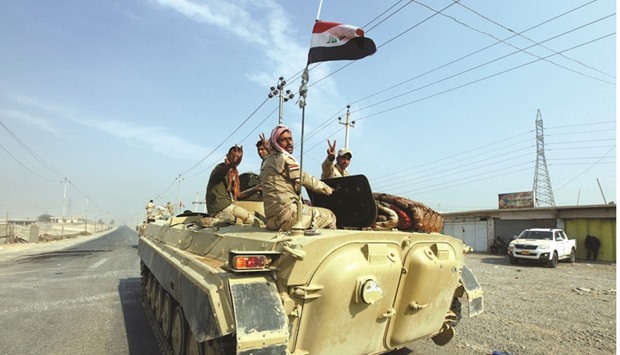Islamic State fighters kept up yesterday their fierce defence of the southern approaches to Mosul, which has held up Iraqi troops there and forced an elite army unit east of the city to put a more rapid advance on hold.
Ten days into what is expected to be the biggest ground offensive in Iraq since the US-led invasion of 2003, army and federal police units aim to dislodge the militants from villages in the region of Shora, 30km south of Mosul.
The frontlines in other areas have moved much closer to the edges of the city, the last major stronghold under control of the militants in Iraq, who have held it since 2014.
The elite army unit which moved in from the east has paused its advance as it approaches built-up areas, waiting for the other attacking forces to close the gap.
“As Iraqi forces move closer to Mosul, we see that Daesh resistance is getting stronger,” said Maj. Chris Parker, a coalition spokesman at the Qayyara airbase south of Mosul that serves as a hub for the campaign.
Daesh is an Arabic acronym for Islamic State, also known as ISIS or ISIL.
The combat ahead is likely to get more deadly as 1.5mn residents remain in the city and worst-case UN forecasts see up to a million people being uprooted.
A Reuters correspondent on the southern front met villagers and police who said their relatives had been taken as human shields to cover the fighters’ retreat from the area.
The militants have been using suicide car-bombs extensively to fight off the advancing troops, according to Major General Najm al-Jabouri, the commander of the Mosul operations.
He said his soldiers had destroyed at least 95 car bombs since the battle started on Oct. 17.
Outside the village of Saf al-Tuth, Jabouri directed heavy machinegun fire at a sparse concrete building on a ridge where his men believed a sniper was hunkered down.
Volleys of rockets flew over the ridge with a whoosh and pounded the village itself with loud booms.
UN aid agencies said the fighting has so far forced about 10,600 people to flee.
“Assessments have recorded a significant number of female-headed households, raising concerns around the detention or capture of men and boys,” said a press release from the office of the UN humanitarian co-ordinator for Iraq, Lise Grande.
Grande said yesterday that a mass exodus could happen, maybe within the next few days.
In the worst case scenario, Grande said it was also possible that Islamic State fighters could resort to “rudimentary chemical weapons” to hold back the impending assault.
The fall of Mosul would mark Islamic State’s effective defeat in Iraq.
The city, sometimes described as Iraq’s second largest, is many times bigger than any other Islamic State has ever captured, and it was from its Grand Mosque that the group’s leader Abu Bakr al-Baghdadi declared a “caliphate” that also spans parts of Syria.
US Defence Secretary Ash Carter said on Tuesday an attack on Raqqa, Islamic State’s main stronghold in Syria, would start while the battle of Mosul is still unfolding.
It was the first official suggestion that US-backed forces in both countries could soon mount simultaneous operations to crush the self-proclaimed caliphate once and for all.
A senior US official said about 50,0000 Iraqi ground troops are taking part in the offensive, including a core force of 30,000 from the government’s armed forces, 10,000 Kurdish fighters and the remaining 10,000 from police and local volunteers.
Iraqi army units are deployed to the south and east, while Kurdish fighters are attacking from the east and the north of the city where 5,000 to 6,000 militants are dug in, according to Iraqi military estimates.
Roughly 5,000 US troops are also in Iraq.
More than 100 of them are embedded with Iraqi and Kurdish peshmerga forces advising commanders and helping coalition air power in hitting targets.
They are not deployed on frontlines.
Turkish Foreign Minister Mevlut Cavusoglu said yesterday Turkey would take measures should the Iranian-backed militias attack Tal Afar.

Iraq army drives military vehicle during the operation against Islamic State militants in Qayyara, south of Mosul, yesterday.
